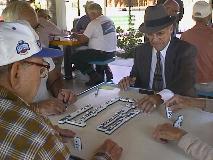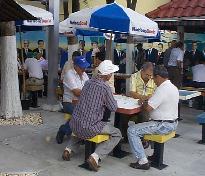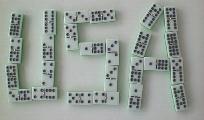|
From Cuba, With Love

 Thursday, February 25, 1999, Little Havana, Miami, Florida -
It's a warm, sunny day in Little Havana, and at the corner of 8th and 15th you will find a little city park where the men come to play dominos, and they come to talk Spanish, their native tongue, and they come to talk of Cuba, their native country. It is a very small park, with about a dozen tables under canopied ramadas, and amid the traffic noise and the clattering of dominos and the occasional laughter, you can hear the sound of men in love with their country.
Thursday, February 25, 1999, Little Havana, Miami, Florida -
It's a warm, sunny day in Little Havana, and at the corner of 8th and 15th you will find a little city park where the men come to play dominos, and they come to talk Spanish, their native tongue, and they come to talk of Cuba, their native country. It is a very small park, with about a dozen tables under canopied ramadas, and amid the traffic noise and the clattering of dominos and the occasional laughter, you can hear the sound of men in love with their country.
Domino
Theory
Dominos is usually played with two teams of two people. Each player takes ten tiles from the center, and the remaining tiles are moved aside. First turns are rotated.

I have been paired up with Enrique, who's English is much better than my Spanish. He explains a few rules; End each hand with as few tiles as possible, and try to be the first to run clean out of tiles. If you go "out" then your team gets the points remaining in the other team's hands. Play until one team reaches 100 points.
Our first round goes rather well, and though I don't go out, I have only one tile left when the round ends, and I cost us a mere 5 points. The main strategy is to use tiles which have high numbers first.
There are only two places you can put your tiles; on either end of the tiles already played (see top photo.) There is no "cutting in" allowed.
Round two goes better, as I actually take control of the game for a while. Enrique explains how it was good that I put a 3 on one end, when the other end had a 3 also. This forced people to pass unless they had a 3, which no one had. Somehow, I still lose this round.
Doubles mean trouble, because you want as many different numbers in your hand as possible. If you are dealt five doubles tiles, you can even call for a re-deal. When you don't have any matching tiles to play, you "pass" by tapping the table. I end up tapping more than playing.
From across the table, Enrique starts to explain some strategy to me, but with the crashing of dominos around us, and with Enrique's thick Cuban accent and my thick head, I don't get it.
Men are standing around me, watching this young Yankee drown in their game of dots, and I'm tapping away, and just when I think I've got it, Enrique gets up with an "oh well" smile and motions me to join him, and I realize that I have just lost my first real game of dominos.
|
Maximo Gomez Park has been the hotspot for playing the tiles for fifteen years. Some come here to play chess or cards, but most of the action is on the dominos tables, and the competition is tough. 64 year-old Henry Diaz comes here nearly every day to stir up some competition and conversation.
 Diaz, 64, arrived in America the same year as I did; 1960. He is a U.S. citizen and has lived in Miami for 16 years. Quiet and good-natured, Diaz routinely talks through a smile. After a career in dry cleaning, he still keeps his clothes fresh, and today he is wearing a handsome, brown suit with a fedora. Most men here are dressed in shorts and casual shirts, even a few traditional guyebera shirts, and Diaz stands out in his finery.
Diaz, 64, arrived in America the same year as I did; 1960. He is a U.S. citizen and has lived in Miami for 16 years. Quiet and good-natured, Diaz routinely talks through a smile. After a career in dry cleaning, he still keeps his clothes fresh, and today he is wearing a handsome, brown suit with a fedora. Most men here are dressed in shorts and casual shirts, even a few traditional guyebera shirts, and Diaz stands out in his finery.
His daughter is a lawyer, and he has a granddaughter and a grandson, but he doesn't play dominos much with them. "Children over here, they don't think of dominos," he says. "They want new cars, they want to go to the movies."
 A day in this park is fun and relaxing. The men sit for hours on short, backless stools, playing dominos and talking. The losing team gives up the table to the winners and another team, so they get to walk around, watch other games, or sit on the benches and talk and watch traffic - there's always something to do. "Sometimes it's better here than at home," Diaz says, smiling. "I'm just kidding."
A day in this park is fun and relaxing. The men sit for hours on short, backless stools, playing dominos and talking. The losing team gives up the table to the winners and another team, so they get to walk around, watch other games, or sit on the benches and talk and watch traffic - there's always something to do. "Sometimes it's better here than at home," Diaz says, smiling. "I'm just kidding."

The park is open from 9am to 6pm every day, and it is very regulated. I had someone translate the Spanish rules sign for me; it says that you must wear a shirt and shoes. Also, no littering, swearing, spitting or firearms. It doesn't say anything about alcohol, but I don't see anybody drinking. It doesn't prohibit gambling, either, but Diaz assures me that doesn't occur. "If you break the rules, they take your card away," he says.
 Though Maximo Gomez is a city park, only members and their guests may play at the tables here. To be a member, you must show residency and proof that you are at least 54 years of age. Requiring membership gives the security guard and the park ranger, Delores Robaina, more control over the patrons, and only a handful of people have had to be disciplined here since it opened. Though it isn't a written rule, dominos seems to be a man's game, and during my two visits, I only see one woman in the crowd of thirty or forty men.
Though Maximo Gomez is a city park, only members and their guests may play at the tables here. To be a member, you must show residency and proof that you are at least 54 years of age. Requiring membership gives the security guard and the park ranger, Delores Robaina, more control over the patrons, and only a handful of people have had to be disciplined here since it opened. Though it isn't a written rule, dominos seems to be a man's game, and during my two visits, I only see one woman in the crowd of thirty or forty men.
Each round of Dominos is played very quickly, and the conversation wanes as concentration builds during the action. Between rounds, the players throw their tiles in the center and then shuffle them. The hard plastic tiles crashing against each other and on the table make for a cacophonous type of applause to end the round. The conversation picks up and is loud, to carry over the applause, and then it settles down again, dozens of times each hour. Much of the conversation is about the homeland, Diaz tells me. "Over here, you get the latest news from Cuba," he says. Diaz and his friends talk of Cuba often, but he has no desire to return.
"Everything now I get is over here," he says. "I don't even know where my family is over there." In fact, Diaz has not been to Cuba since 1960. "I don't change this country for anything," he says. He is not alone in this group of men who fled Cuba and Castro, who abandoned their lives for safety and democracy in the United States. He is not alone in his passionate love for his adopted homeland. "I tell you, when you talk to people here," Henry Diaz tells me through a beautiful smile, "you can tell we love America."

|